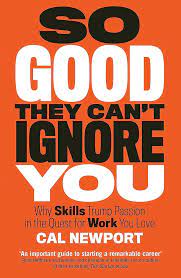So Good They Can't Ignore You by Cal Newport

Summary: Cal Newport is my favorite productivity author. His books have inspired a big shift in the way that I think about careers, work, and productivity.
In So Good They Can’t Ignore You, Cal breaks down what makes a great career. He found that the prevailing hypothesis is the “Passion Hypothesis”, which states that one should follow their passion to find work they love. Cal refutes this theory, stating instead that one should focus on developing rare and valuable skills, in order to develop a career that is rare and valuable. In other words, you should focus on becoming “So Good They Can’t Ignore You.”
Rating: 9/10
Big Ideas
1. Passion vs. Craftsman Mindset
The passion hypothesis is that “the key to occupational happiness is to fist figure out what you’re passionate about and then find a job that matches this passion.” This hypothesis was popularized by advice like that given by Steve Job’s in his Stanford commencement speech. Steve stated “you’ve got to find what you love…[T]he only way to do great work is to love what you do. If you haven’t found it yet, keep looking, and don’t settle.”
Funny enough, if you closely examine Steve Jobs’ life, this is not how he created his career. Steve was spending his time seeking spiritual enlightenment, while only dabbling in electronics when it promised quick cash.
There are other flaws with the passion hypothesis:
- It assumes that we all have a pre-existing passion
- Many folks get stuck continually job hopping, hoping their next work is the “right fit” only to be perpetually dissatisfied.
- The passion hypothesis often leaves people with more questions than answers.
Enter: the Craftsman Mindset
Steve Martin has a successful and gratifying career in comedy. Many struggling performers ask Martin for advice, but “nobody ever takes not of [my advice], because it’s not the answer they wanted to hear. What they want to hear is ‘Here’s how you get an agent, here’s how you write a script,’…but I always say, ‘Be so good they can’t ignore you.”
The craftsman mindset, as opposed to the passion mindset, suggests that you should focus on doing great work, rather than on finding great work.
2. Components of Great Work
According to Daniel Pink’s work, the science of motivation is unequilocal. In order to feel intrinsically motivated, one needs to find work with:
- Autonomy: the feeling that you have control over your day, and that your actions are important
- Competence: the feeling that you are good at what you do
- Relatedness: the feeling of connection to other people
The traits that define great work, according to Newport, are related:
- Creativity: work that requires you to think outside the box
- Impact: work that has a strong positive effect on the world
- Control: work where you get to decide what to do and/or how to do it
Note that these factors are rare in any job. Entry level jobs generally don’t hand out these attributes.
3. Career Capital
The traits that define great work are rare and valuable. Supply and demand says that if you want these traits you need rare and valuable skills to offer in return. Think of these rare and valuable skills you can offer as your career capital.
“Basic economic theory tells us that if you want something that’s both rare and valuable, you need something rare and valuable to offer in return— this is Supply and Demand 101. It follows that if you want a great job, you need something of great value to offer in return.”
4. Deliberate Practice
So, how do you become So Good They Can’t Ignore You, in order to develop significant career capital? Newport states that you must engage in deliberate practice.
Deliberate practice is a term coined by psychology professor Anders Ericsson. Ericsson states that “Most individuals who start as active professionals…change their behavior and increase their performance for a limited time until they reach an acceptable level. Beyond this point, however, further improvements appear to be unpredictable and the number of years of work…is a poor predictor of attained performance.” Put another way, if you just show up and work hard, you’ll soon hit a performance plateau beyond which you fail to get any better.
While standard practice might include mindless repetitions, deliberate practice requir3es focused attention and is conducted with the specific goal of improving performance. Mindless activity is the enemy of deliberate practice.
The core elements of deliberate practice are:
- Motivation: you must be motivated to put in the effort required to stretch your comfort zone.
- Focus: placing your full attention on the task at hand.
- Feedback: getting immediate informative feedback about your performance.
- Repetition: repeating the practice over and over.
Obviously, not many white collar professionals regularly engage in deliberate practice. If you do, you’ll have a huge leg up. Newport cites Alex Berger, a television writer, seeking out relentless feedback on scripts, as well as Mike Jackson, a clean energy VC, who obsessively tracks his time.
5. Control
Once you have developed career capital, you should invest it in gaining more control over your working life. With enough career capital, at the point where your employer feels they would be seriously missing out if they lost you, you should exchange this capital for more control. You can ask to work remotely, work fewer hours, work with different people, etc.
The point is, you can and should use this career capital to control your working life in a positive way. However, beware, you should NOT attempt to seek more control without first demonstrating the necessary career capital required to attain it.